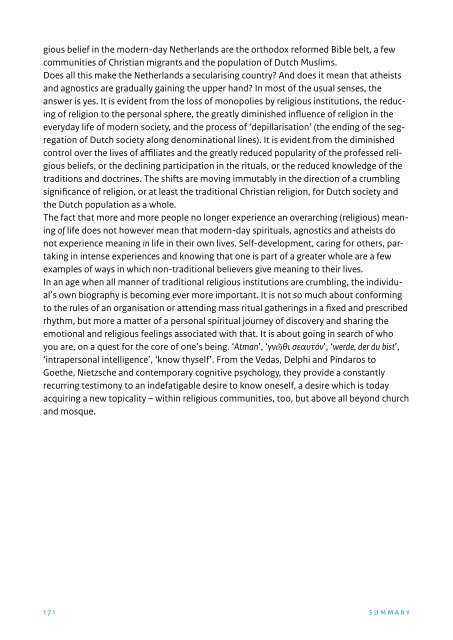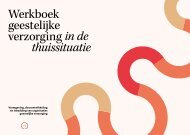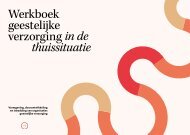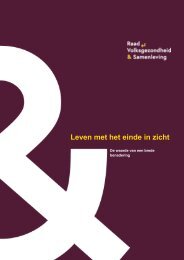Buiten kerk en moskee
Religie in een pluriforme samenleving. Diversiteit en verandering in beeld.
Religie in een pluriforme samenleving. Diversiteit en verandering in beeld.
You also want an ePaper? Increase the reach of your titles
YUMPU automatically turns print PDFs into web optimized ePapers that Google loves.
gious belief in the modern-day Netherlands are the orthodox reformed Bible belt, a few<br />
communities of Christian migrants and the population of Dutch Muslims.<br />
Does all this make the Netherlands a secularising country? And does it mean that atheists<br />
and agnostics are gradually gaining the upper hand? In most of the usual s<strong>en</strong>ses, the<br />
answer is yes. It is evid<strong>en</strong>t from the loss of monopolies by religious institutions, the reducing<br />
of religion to the personal sphere, the greatly diminished influ<strong>en</strong>ce of religion in the<br />
everyday life of modern society, and the process of ‘depillarisation’ (the <strong>en</strong>ding of the segregation<br />
of Dutch society along d<strong>en</strong>ominational lines). It is evid<strong>en</strong>t from the diminished<br />
control over the lives of affiliates and the greatly reduced popularity of the professed religious<br />
beliefs, or the declining participation in the rituals, or the reduced knowledge of the<br />
traditions and doctrines. The shifts are moving immutably in the direction of a crumbling<br />
significance of religion, or at least the traditional Christian religion, for Dutch society and<br />
the Dutch population as a whole.<br />
The fact that more and more people no longer experi<strong>en</strong>ce an overarching (religious) meaning<br />
of life does not however mean that modern-day spirituals, agnostics and atheists do<br />
not experi<strong>en</strong>ce meaning in life in their own lives. Self-developm<strong>en</strong>t, caring for others, partaking<br />
in int<strong>en</strong>se experi<strong>en</strong>ces and knowing that one is part of a greater whole are a few<br />
examples of ways in which non-traditional believers give meaning to their lives.<br />
In an age wh<strong>en</strong> all manner of traditional religious institutions are crumbling, the individual’s<br />
own biography is becoming ever more important. It is not so much about conforming<br />
to the rules of an organisation or att<strong>en</strong>ding mass ritual gatherings in a fixed and prescribed<br />
rhythm, but more a matter of a personal spiritual journey of discovery and sharing the<br />
emotional and religious feelings associated with that. It is about going in search of who<br />
you are, on a quest for the core of one’s being. ‘Atman’, ‘γνῶθι σεαυτόν’, ‘werde, der du bist’,<br />
‘intrapersonal intellig<strong>en</strong>ce’, ‘know thyself’. From the Vedas, Delphi and Pindaros to<br />
Goethe, Nietzsche and contemporary cognitive psychology, they provide a constantly<br />
recurring testimony to an indefatigable desire to know oneself, a desire which is today<br />
acquiring a new topicality – within religious communities, too, but above all beyond church<br />
and mosque.<br />
171 s u m m a r y










